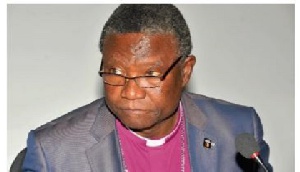Identified hotspots across the country were relatively peaceful during the 2016 polls due to the establishment of National and Regional Early Warning and Response Groups (NEEWARGs/REEWARGs) by the National Peace Council (NPC).
A research conducted by the Institute for Development studies (IDS) of the University of Cape Coast (UCC) with support from the NPC and the United Nations Development Programme (UNDP), has established.
The NPC had therefore been urged to explore the possibility of linking the Groups up with the Regional Coordinating Councils and District Assemblies for funding and the provision of other logistical support to strengthen their activities to consolidate the successes chalked.
The research, dubbed, “Preventing Electoral Violence in selected hotspots in Ghana during the 2016 elections: Strategies employed by the National Peace Council”, documented and assessed the effectiveness of the strategies adopted by the NPC to maintain peace in selected hotspots during the elections.
The research, led by Professor Stephen Kendie and four others, also recommended that the NPC and its stakeholders focus and strategise on how to address post elections violence since issues after elections were often overlooked though they remained a major security threat.
The research team further encouraged the NPC to intensify its peace education in schools and communities by linking up with Civil Society Organisations (CSOs) and the Information Service Department at the local level.
Presenting the research findings, Dr. Patrick Osei-Kuffuor, member of the research team said the study was an evaluation exercise to unearth the activities that worked to provide lessons for subsequent elections.
He said the 2016 elections were generally peaceful without the violence that characterized previous elections and that their work sought to identify the contributions of the NPC in achieving peace during the general election.
He said the NPC as per its mandate, adopted several strategies prior to the election, some of which included creating platforms for engagement with youth groups, media, traditional and religious leaders, political parties and the formation of NEEWARGs/REEWARGs.
Dr Osei-Kuffuor said such engagements were very instrumental in creating the necessary awareness for a violence free elections at the identified hotspots across the country.
Reverend Professor Emmanuel Asante, Chairman of the NPC indicated that choosing the path of peace, dialogue and non-violence in a pluralistic society such as Ghana was a necessity.
According to him, a society of diverse ethnic, religious and political identities was inextricably linked to conflict at the individual and group levels and therefore, people must be willing to cooperate and act collectively to avoid it.
Prof Asante said such conflicts and disagreements should provide better understanding of each other’s interest, dreams and as well as strengthen and deepen social cohesion but not to destroy them.
Professor Amuquandoh, Dean, Faculty of Social Science, UCC reiterated that efforts to ensure peace could not be left in the hands of few people but a collaborative responsibility towards lasting peace in the country.
He said, to be successful in maintaining the peace that Ghana had enjoyed, there was the need to reflect on what has been done right and what needed to be done.
General News of Friday, 13 July 2018
Source: ghananewsagency.org













